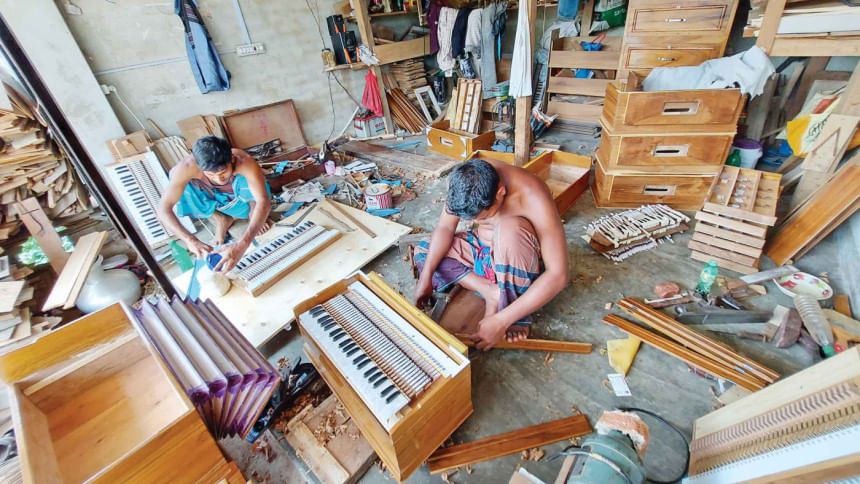Harmonium-making brings them success

In something of an unexpected turn in the region's history, local musical instrument production, especially of harmoniums, have found a home in two villages of Barishal's Baraipara upazila.
Banaripara, some 10-12km away from Barishal district, is now home to at least three new harmonium factories set up over the last two years.
Around 1,000 to 1,500 instruments worth around Tk 4 crore are being produced and sent from these factories to several parts of the country, including Dhaka, Khulna and Sylhet every year, this correspondent found after talking to factory owners and artisans.
As a result, employment in the two remote villages of Gava and Narerkathi, and a number of surrounding villages, have increased.
Talking to this correspondent recently, Saidur Rahman, president of Barishal Chamber of Commerce and Industries, heralded the manufacturer's efforts, saying that such small-scale manufacturing systems play a vital role in the rural economy.
At Gava, Sujoy Mandal has set up a harmonium factory at a place adjacent to the primary school on the bank of the Narerkathi canal. Artisan Sumon Mandal works at the factory. He told this correspondent that they supply at least 500 harmoniums in one calendar year. From Gava, the instruments reach the shores of Dhaka, Sylhet, and Khulna, to shelves of popular stores in Dhaka and Khulna.
Sumon Mistry, who works at Sujoy's factory, said each harmonium produced by them sells from Tk 12,000 to Tk 35,000. The factories make a profit of around 20 percent from a single harmonium.
Jiban Sarker owns the other factory in the village. His factory produces around the same number of harmoniums per year, he told this correspondent.
"Around 1,200 to 1,500 harmoniums, worth almost Tk 4 crore are produced and sold across the country from the two villages," he said.
Hasan Maqsood, cultural officer of Bangladesh Shilpakala Academy, Barishal district unit, attributed the rising demand of musical instruments to the increased opportunity to practise music under various organisations, including educational institutions at the upazila level.
Babu Mistry, owner of a factory at Narerkathi village, said at least 300 harmoniums are sold by them every year.
Artisans said the major material they use for the harmoniums is reed, imported from India, while Burmese teak timber is also used. These timbers are bought for Tk 5,500 to 6,000 per cubic foot of timber.
Factory owner Sujoy Mondal is one of the pioneers of making harmoniums in the region. As someone who's seen it grow from the start, he knows what they need to expand the scope of the craft.
He said he used to make harmoniums at a store in Dhaka. "Around two years back, I decided to come back to my village and start on my own. Soon, others joined in and got involved," he added.
"It would be great if we had some capital to work with. If we could receive Small and Medium Entrepreneur (SME) loans, it would work wonders for us," he said.
Jalish Mahamud, deputy general manager of BSCIC, said, "It's possible... If the harmonium makers want to have access to these loans, they can register as SMEs, after which the the loan procedure can be initiated."

 For all latest news, follow The Daily Star's Google News channel.
For all latest news, follow The Daily Star's Google News channel. 



Comments